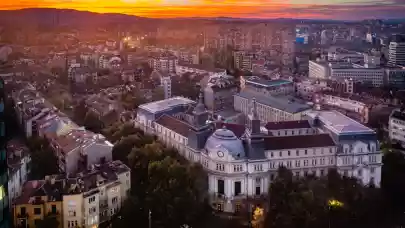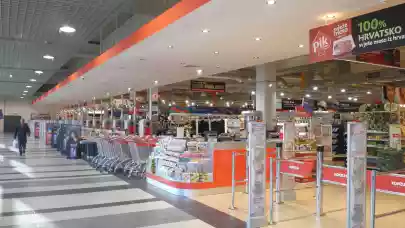
The activity on the Bulgarian real estate market was strongly affected by the COVID-19 crisis, but we saw more resilience for the investment and industrial sectors which registered both an increase during the last year. For 2021, the forecasts are still positive for the investment property market and for the industrial development sector, according to the Sofia City Report H2 2020, released by JLL Romania with the support of IPC Partners Bulgaria.
The investment market increased in 2020, despite the pandemic
During 2020 the total value of investment transactions in Bulgaria amounted to approximately €216 million, compared to €170 million in 2019.
The investment activity in the first half of 2020 was significant. However, international investors are cautious now because of the health and economic crisis. Some of them cancelled their investments, especially in the retail and office segments. Furthermore, since March 2020 international travels have been limited, which also plays a role in the negotiation of new deals.
In the second half of the year, a few smaller deals were concluded, such as the sale of the Holiday Inn Hotel in Sofia by Meridian Leisure Hotels to Videolux Holding for €15 million, the sale of Mall Veliko Tarnovo by VT Mall to AGI-BRE Participations 3 for €12 million, and the sale of 6 Tsar Osvoboditel Office Building in Sofia by Serdika Properties tо Maveli, for €10.85 million.
“We might experience a higher investment activity in 2021 as there will likely be an increase in the number of distressed assets. Some investors might take advantage of the discounts especially considering the low interest rates and abundance of liquidity in the financial markets,” says Maya Baltadjieva, Managing partner IPC partners, Bulgaria.
Prime office yields stood stable in H2 2020 at 7.50%, while prime shopping centre yields increased from 7.25% in H1, to 7.50% in H2 2020. During the same period, prime industrial yields decreased from 9.50% to 9.00%. Yields for offices and retail remain under pressure as the consequences of the health crisis are hitting their cash flows. It is likely that yields will increase in 2021.
“Bulgaria enjoys a lot of growth potential in the future and this is undeterred by the pandemic. The investment segment and especially the industrial sector proved resilience in 2020 in the face of the medical crisis and subsequent restrictions. Although the retail and office segments were hit harder by the emergency situation, we expect to see a quick recovery once the COVID-19 outbreak in Europe is put under control”, says Alexandru David, Head of Research JLL Romania and Bulgaria.
The office market was dominated by renewals and relocations
The total leasing volume in Sofia for H1 2020 was around 56,600 sqm, which was 15% less when compared to H1 2019. The negative trend continued in H2 2020 and these were the worst 6 months for the office market to date. The total take-up volume for H2 2020 was around 51,200 sqm. The market was dominated by renewals and relocations with more than 90% share in total take-up.
The annual net take-up amounted to 8,500 sqm, which is a record low level and a clear indicator of a serious slowdown in the office market in 2020.
“Subleases are becoming popular as tenants attempt to optimize their costs due to the work from home policies and/or decrease in revenues. Companies are becoming more careful in terms of increasing their number of employees, or renting additional office space, and are considering the option of letting more employees work from home permanently or implement a hybrid system of work from home and work from the office,” says Konstantin Vladov, Head of Office Space at IPC Partners Bulgaria.
In H2 2020, the offices remained empty as most of the companies refrained from recalling their employees back to the office. In contrast, there is an increase of requests for co-working office space. In the long run, the trends are positive as Sofia is very attractive for foreign companies to outsource and/or centralize some of their processes in the city.
Sofia is still one of the cheapest places in Europe to hire office employees and will be on the radar for companies that are looking for more efficient ways of doing business. The IT and BPO companies continued to hire people even during the pandemic and the expectations are that these two segments will be the driving force in the recovery of the office market.
During H2 2020 the office vacancy rate increased rapidly, reaching 13.6%. After strong new office deliveries in 2020 and because of the COVID-19 worldwide crisis, vacancy is expected to further increase in 2021.
The current modern stock in Sofia was 2.36 million sqm at the end of 2020, out of which 71% was considered Class A. New offices totalling 72,000 sqm were delivered in Sofia in H1 2020 and another 57,500 sqm in H2 2020. Therefore, 129,500 sqm were delivered for the whole of 2020, compared to 181,500 sqm in 2019.
Around 227,000 sqm of office space are expected to be completed during 2021. The projects already under construction are not facing significant delays or change in floor plans. However, given the economic slowdown and depressed demand for office space, some of the new projects might be cancelled and new constructions are unlikely to start during the next 12 months.
Retail parks in the spotlight
By the end of 2020, the total modern retail stock in Bulgaria, including shopping centres, retail parks and outlet centres, is approximately 1.1 mill. sqm, out of which 542,800 sqm in Sofia. Currently, only retail parks are being developed.
The vacancy rate in Sofia increased from 5% at the end of 2019 to about 7.9% by the end of 2020, with Q3 vacancy as high as 9%. Vacancy outside of Sofia increased from 10.1% to 12% during the same period.
2020 had lower activity in terms of new openings compared to the previous years. Expansions and new entries might be postponed. The health and economic crisis made the retailers more cautious in their expansion plans. It also forced retailers to focus on online sales, but this cannot compensate for the loss from the physical stores. This resulted in higher vacancy rates and put pressure on the rent levels.
The new store openings in 2020 were only 38,600 sqm, compared to 60,000 sqm in the previous year. This is a decrease of 57%, which was a result of the lockdowns and the overall downward economic trend.
Continuing the same trend as in 2020, no new shopping centres are expected to be delivered in 2021 in Sofia.
“Currently the developers’ and retailers’ focus is shifting from shopping centres towards retail parks. Several such projects were started in Q4 2020, and are expected to be delivered by H1 2022. In 2021 will be opened Park Sevlievo, with 5,000 sqm GLA,” says Borislav Borisov, Manager, Retail Space and Property Management in IPC partners, Bulgaria.
A challenging year for the industrial market
2020 was a good year for the market. Total take-up reached almost 62,000 sqm in H2 2020, out of which net take-up accounted for about 38,000 sqm.
The COVID-19 crisis and the lockdowns of many physical shops increased online trade and thus increased the demand for warehouses from e-commerce companies. Their main interest is for premises of 1,000-2,000 sqm within the city boundaries of Sofia.
However, 2020 was difficult for the manufacturing segment, as the COVID-19 crisis hit both international supply chains and international demand. Industrial production and exports have been declining throughout the year. However, Bulgaria is keeping its attractiveness as an investment destination and can benefit from the revised supply chains worldwide.
Demand in Sofia is focused on warehouses with sizes from 1,000 sqm to 5,000 sqm. Most companies planning to open logistic centres in Sofia are global players, looking for modern warehouses. Since there was a lack of existing options, they all preferred built-to-suit projects or to own their facilities.
Now there is some significant supply coming to the market, so there will be more alternatives for the tenants. Although the Sofia logistics market registered weak activity in H1, driven mostly by renewals and deliveries of owner-occupied space, H2 was significantly better and recorded the best performance for the past few years.
The logistics market is currently the most attractive segment for investors. The healthy levels of demand, vacancy rates, rents and yields of the logistics market around Sofia led to several notable investments in land plots. One of them was the purchase of a 175,000 sqm land plot by CTP, which is planning to develop a 100,000 sqm logistics park by the end of 2021. There have been a few deals with land in the industrial zones around Sofia as well.
The Sofia industrial property market ended 2019 with a supply increase, due to some large deliveries of production and logistics spaces. Over 260,000 sqm were delivered for the entire year, total industrial stock reaching almost 1.3 million sqm.
However, activity in H1 2020 was weak and only about 60,000 sqm were delivered during the period. In H2 2020, an additional 66,500 sqm were delivered. Thus, the total stock reached approximately 1.4 million sqm at the end of 2020. Another 298,560 sqm are under construction, out of which approximately 70,000 sqm are for rent.
Prime industrial rental levels in Sofia remained stable during H2, between €4.2-4.4 per sqm per month. The most popular area is still Sofia Airport, where the vacancy rate is very low and asking rents are generally higher. At the outskirts, newly built modern warehouses are offered at slightly lower rents, ranging between €4 and €4.50 per sqm. In the northern and western parts of Sofia, properties are also becoming more attractive and are available between €3 and €4 per sqm. The rent for old units remains stable at around €2.50 per sqm.
Vacancy in industrial projects is around 5% in Sofia and is projected to remain at this level or slightly higher during 2021, as most of the new schemes open with a high percentage of pre-let space. However, the pipeline is also significant.



